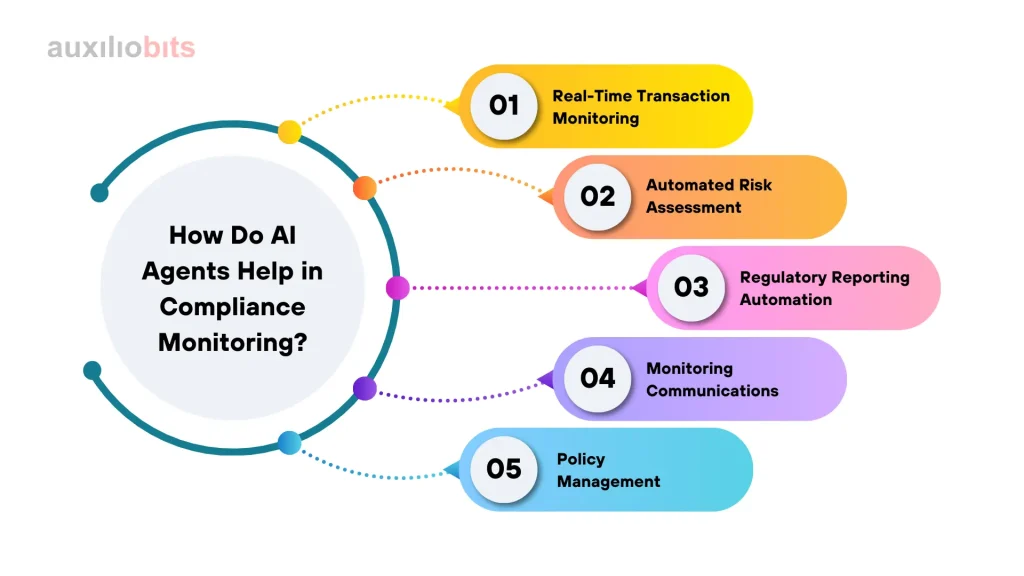
Key Takeaways
- AI agents enable banks to move from reactive to proactive compliance by continuously monitoring transactions, detecting risks early, and ensuring timely regulatory reporting, minimizing violations and penalties.
- With real-time capabilities, AI agents analyze massive transaction volumes to identify suspicious activities instantly, supporting effective fraud prevention and maintaining regulatory standards in financial institutions.
- AI agents reduce manual errors by leveraging machine learning and analytics, thereby improving the precision and speed of compliance processes, which in turn boosts both operational performance and audit readiness.
- AI-driven systems scale effortlessly with growing data volumes and complex operations, enabling banks to maintain consistent regulatory oversight without incurring significant increases in infrastructure or human resource costs.
- AI agents track regulatory updates, align internal policies, and automate compliance reporting, ensuring organizations stay current with evolving regulations while reducing human effort and improving documentation quality.
One key factor that banks and financial institutions should not overlook is regulatory compliance. To prevent unwanted fraud, keep customers safe, and ensure transparency, financial institutions are utilizing all relevant rules and regulations. If they fail to follow the set regulations, there can be severe challenges. Some of these challenges include fines, operational restrictions, reputational damage, and loss of consumer trust. As a result, financial settings are unable to attract new clients.
Traditionally, compliance monitoring has been considered a manual procedure, relying on analysts to review transactions, operational activities, and documentation. Nevertheless, manual compliance procedures not only result in mistakes but also consume a significant amount of time. Therefore, to avoid such challenges, financial institutions should start utilizing AI agents. These are independent systems that possess the capabilities to automate and enhance regulatory compliance procedures.
Also read: Technical Approaches to AI Agent Prompt Engineering Across Industries.
Why Compliance Monitoring Needs AI Agents?
Over the past few decades, financial institutions have faced significant challenges in managing vast amounts of data regularly. From handling loan applications to ensuring effective communication and monitoring customer transactions, the processes have not been smooth.
One reason why all the data matters is that regulatory frameworks need it to be stored in compliance, monitored, and analyzed. However, conventional compliance monitoring techniques do not fulfill these needs because they are slow and prone to errors. Failing to meet these requirements can result in unwanted penalties, hindered operations, and damage to the company. Hence, to avoid such challenges, it is beneficial to utilize AI agents. These agents can process large datasets, including structured and unstructured data. Any activity conducted by AI agents is superior to that of human beings. Apart from this, AI agents can also find out anomalies and compliance risks before it is too late. This benefit allows financial institutions to address challenges before they escalate into regulatory violations.
AI agents also help automate reports, ensuring that the documentation received by regulators is consistent, accurate, and delivered on time. They also help maintain audit trails, ensuring transparency during regulatory reviews and inspections. By integrating AI agents into their compliance monitoring frameworks, banks can significantly enhance operational efficiency, reduce compliance costs, and minimize the risk of penalties. More importantly, AI-driven compliance systems enable banks to transition from reactive to proactive compliance management, staying ahead of regulatory changes and demonstrating a strong commitment to ethical and responsible financial practices in an increasingly demanding global environment.
How Do AI Agents Help in Compliance Monitoring?
AI agents are transforming how banks manage regulatory compliance, making processes more efficient, accurate, and proactive. Here’s how they are enhancing compliance monitoring in the banking sector:

1. Real-Time Transaction Monitoring
AI agents can analyze thousands of transactions in real-time, identifying patterns that may indicate suspicious activity. For example, unusual transfer amounts, rapid transactions from high-risk countries, or uncharacteristic international activity can all be flagged as potential signs of money laundering, fraud, or financing of illegal activities. By monitoring transactions as they occur, AI agents enable banks to intervene immediately, thereby mitigating risks before they escalate into significant issues. This proactive approach to transaction monitoring helps maintain regulatory compliance and prevents financial crimes.
2. Automated Risk Assessment
Traditional risk assessments are conducted periodically, often resulting in delays in identifying emerging threats or vulnerabilities. AI agents, however, are capable of continuous risk evaluation based on live data. By analyzing a wide range of factors, including customer behavior, transaction histories, and market conditions, AI agents can instantly identify high-risk customers, products, or operations. This ongoing risk assessment ensures that compliance teams are always aware of potential threats and can take immediate corrective actions, reducing the likelihood of regulatory breaches.
3. Regulatory Reporting Automation
Compiling and preparing reports for regulatory authorities is a time-consuming task that can often take weeks. AI agents significantly streamline this process. They can automatically gather relevant data, fill in required reporting templates, and even suggest narratives or explanations based on detected trends and anomalies. By automating these tasks, AI agents shorten reporting cycles, reduce human errors, and ensure that reports are accurate, timely, and compliant with regulatory standards.
4. Monitoring Communications
AI agents equipped with natural language processing (NLP) capabilities are capable of analyzing a vast array of communications, including emails, chat messages, and recorded calls. By scanning for keywords, phrases, or behaviors that could indicate insider trading, fraudulent activities, or breaches of customer confidentiality, AI agents can detect potential compliance violations early. Their ability to sift through and interpret large volumes of text helps banks maintain oversight of internal and external communications without requiring extensive manual effort.
5. Policy Management
Regulatory changes are constant, and keeping internal policies current is crucial for maintaining compliance. AI agents can automatically track changes in regulations, compare them with existing internal policies, and recommend adjustments to ensure compliance. By helping banks stay up-to-date with policy changes, AI agents mitigate the risk of non-compliance due to outdated or overlooked guidelines.
Benefits of AI Agents for Compliance Monitoring
Adopting AI agents for compliance monitoring offers several compelling benefits that can significantly enhance a bank’s ability to meet regulatory requirements while improving operational efficiency. These benefits extend beyond automation, providing banks with strategic advantages in terms of speed, accuracy, cost savings, scalability, and risk management.
1. Speed and Efficiency
ne of the most significant advantages of AI agents is their ability to process and analyze vast amounts of data at high speed. AI agents can monitor transactions, communications, and operational data in real time, flagging potential compliance risks as they occur. Unlike human teams, which are limited by time constraints and manual processes, AI agents can continuously scan thousands or even millions of data points simultaneously, ensuring that compliance monitoring is always up-to-date and accurate. This increased speed enables banks to respond more quickly, address potential issues promptly, and meet the stringent reporting timelines set by regulators.
2. Accuracy
AI agents equipped with advanced machine learning algorithms and data analytics tools can identify patterns and anomalies that humans may overlook. By analyzing historical data and identifying subtle trends, AI agents can detect early signs of fraud, money laundering, or non-compliant behavior, even if those patterns are not immediately apparent to a human auditor. Machine learning models continually improve as they process more data, resulting in increasingly accurate predictions and risk assessments. This high level of precision helps ensure compliance with minimal human error, reducing the risk of regulatory violations caused by overlooked issues.
3. Cost Savings
Automating compliance processes with AI agents can significantly reduce the costs associated with manual labor and large compliance teams. Traditionally, compliance departments are heavily reliant on human resources to monitor activities, analyze data, and generate reports. AI agents, however, can take over many of these tasks, reducing the need for extensive teams and enabling banks to allocate resources more efficiently. Additionally, by proactively identifying compliance risks before they escalate, AI agents help prevent costly fines and penalties that can result from non-compliance.
4. Scalability
As banks expand and handle increasingly larger volumes of data, maintaining compliance can become more complex and resource-intensive. AI agents offer a scalable solution that can easily adapt to growth. They can process and analyze larger volumes of data without requiring significant infrastructure changes or additional personnel. This scalability ensures that as a bank’s operations grow, its compliance monitoring capabilities remain robust and effective, minimizing the risk of compliance gaps.
5. Early Risk Detection
AI agents excel at identifying potential risks before they become significant problems. By continuously analyzing live data, AI agents can spot irregularities or emerging trends that could indicate fraudulent activities, non-compliance, or operational inefficiencies. Early detection enables banks to take proactive measures, mitigating risks before they escalate into significant compliance breaches. This early warning system reduces the likelihood of regulatory penalties and helps maintain a strong reputation in the financial industry.
Conclusion
As the financial industry becomes increasingly regulated and data-driven, banks need to ensure robust compliance with all relevant rules and regulations. Relying on traditional, manual methods can lead to delays, errors, and serious consequences such as fines or loss of trust. AI agents offer a powerful alternative by automating key compliance tasks, such as monitoring transactions, detecting risks early, updating policies, and generating accurate reports. So wait no more, and get started today.








